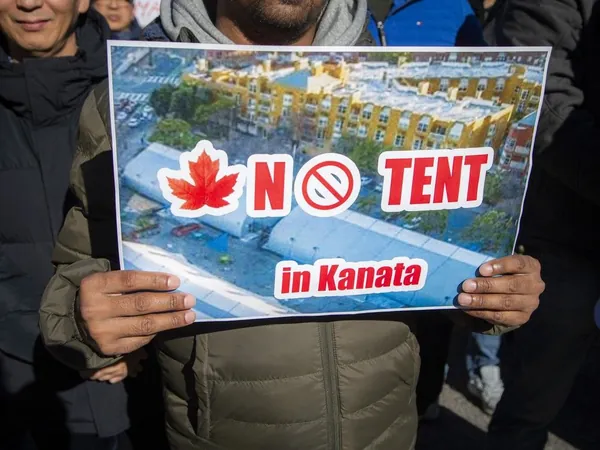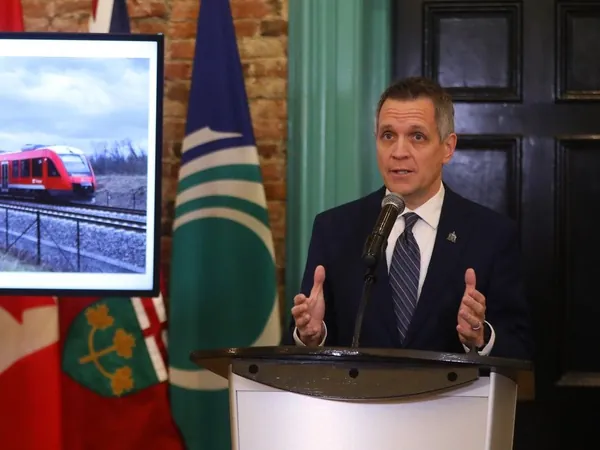
Outcry in Kanata: Residents Rally Against Temporary Housing for Asylum Seekers
2024-11-09
Author: Jacques
In a dramatic demonstration of community sentiment, hundreds of Kanata residents gathered on Saturday to protest the City of Ottawa's controversial plan to establish temporary housing structures for asylum seekers at a local park-and-ride facility.
Earlier this week, the city announced the selection of two sites intended for the construction of tent-like shelters to accommodate refugees and newcomers for a period ranging from 30 to 90 days. The original plan targeted Barrhaven; however, amid significant community pushback, the city opted for locations near the Nepean Sportsplex and Eagleson Road Park and Ride in Kanata.
While the city aims to address a pressing housing crisis, the initiative has ignited a firestorm of concern among local residents, many of whom expressed fears of inadequate infrastructure support. Krista McIntyre, a relatively new Kanata resident, drew parallels to her experience in London, Ontario, where a sudden influx of refugees following a surge in Toronto overwhelmed local services. She voiced her apprehensions, highlighting, “There’s a lack of communication, and the community has not been properly informed about the plan.”
Protesters brandished signs reading "Transparency, not tents," and shouted "Our community, our choice," conveying a message that resonates with their demand for more clarity regarding the city’s housing initiative. McIntyre emphasized that the protest wasn’t driven by anti-refugee feelings, but rather legitimate concerns about resource allocation and the process of community involvement in decision-making.
Kanata-area Councillor Sean Devine shared the perspective of concerned constituents who had reached out to him, revealing that he had received over 100 emails addressing their apprehensions. He categorized the responses into four groups: residents seeking more information, those who recognized a need for temporary housing but opposed it in their area, supportive individuals willing to help, and a subset expressing anti-migrant sentiments.
Devine pointed out that proposing a conversation regarding a "refugee camp" would likely not yield favorable responses, hence why the city council empowered staff to identify temporary housing sites, a move Devine argued was intended to remove political bias from the process.
This housing initiative, somewhat overshadowed by the protests, is part of an urgent effort funded largely by federal dollars to mitigate the growing migrant crisis gripping Ottawa and other key municipalities in Canada. The need for such measures has become increasingly vital; two Ottawa community centers have been sheltering asylum seekers for two years, with an alarming figure of approximately 330 beds currently available at emergency centers, and around 600 newcomers residing in homeless shelters, which constitutes about 60% of users.
Local MPP Lisa MacLeod criticized the city in a statement on social media, stating that residents had not been adequately informed about the plan and calling for public consultations to address community concerns.
Meanwhile, the Ottawa Mission, which serves a critical role in supporting marginalized populations, has previously urged the federal government to enhance its assistance for newcomers, as its downtown shelter reports overcapacity. CEO Peter Tilley recently noted alarming conditions where people were forced to sleep in chairs or on mats due to overwhelming demand.
Councillor Devine firmly stated, “A plan is being implemented. If we do nothing, the Ottawa Mission will continue to be overwhelmed.” He emphasized that the mission has a duty to care for every individual, underlining the necessity of these temporary housing solutions to alleviate pressure on existing facilities.
As these debates unfold, it is essential for all stakeholders – city officials, community members, and advocates for refugees – to engage in constructive dialogue to find a balanced approach that respects community concerns while also addressing the urgent needs of vulnerable populations seeking refuge.









 Brasil (PT)
Brasil (PT)
 Canada (EN)
Canada (EN)
 Chile (ES)
Chile (ES)
 España (ES)
España (ES)
 France (FR)
France (FR)
 Hong Kong (EN)
Hong Kong (EN)
 Italia (IT)
Italia (IT)
 日本 (JA)
日本 (JA)
 Magyarország (HU)
Magyarország (HU)
 Norge (NO)
Norge (NO)
 Polska (PL)
Polska (PL)
 Schweiz (DE)
Schweiz (DE)
 Singapore (EN)
Singapore (EN)
 Sverige (SV)
Sverige (SV)
 Suomi (FI)
Suomi (FI)
 Türkiye (TR)
Türkiye (TR)